This article discusses the story of WeWork, a company that had a failed IPO and then went on to raise capital through a SPAC (Special Purpose Acquisition Company) offering. Despite having billions in capital and time to turn the business around, WeWork ended up as a low-margin company that was burning cash.
The author highlights two key lessons from WeWork’s story:
- Excessive cleverness usually fails: WeWork used financial sleight of hand by discounting depreciation and amortization charges in its adjusted EBITDA (Earnings Before Interest, Taxes, Depreciation, and Amortization) metric to make its results look better than they actually were.
- Don’t scale a low-margin business too quickly: WeWork tried to rapidly grow its office rental business without having a strong economic model to support it. This is a common pitfall for companies that have high growth rates but poor economics.
The author also notes that VCs and private-market investors should be careful not to confuse growth with technology-driven businesses, as being "tech-adjacent" doesn’t necessarily mean you’re a true tech company.
Overall, the article suggests that WeWork’s story serves as a cautionary tale for companies and investors who are focused on rapid growth without considering the underlying economics of their business.



